The Only Writing
Series You'll Ever Need:
Screenwriting
Insider tips and techniques
to write for the silver screen!
Madeline DiMaggio

Adams Media
Avon, Massachusetts
Copyright 2007, F+W Publications, Inc.
All rights reserved. This book, or parts thereof, may not be reproduced in any form without permission from the publisher; exceptions are made for brief excerpts used in published reviews.
Contains portions of material adapted or abridged from The Everything Screenwriting Book
by Robert Pollock, 2003, F+W Publications, Inc.
Published by Adams Media,
an imprint of Simon & Schuster, Inc.
57 Littlefield Street, Avon, MA 02322
www.adamsmedia.com
ISBN 10: 1-59869-288-7
ISBN 13: 978-1-59869-288-4
Printed in Canada.
J I H G F E D C B A
Library of Congress Cataloging-in-Publication Data
available from the publisher
This publication is designed to provide accurate and authoritative information with regard to the subject matter covered. It is sold with the understanding that the publisher is not engaged in rendering legal, accounting, or other professional advice. If legal advice or other expert assistance is required, the services of a competent professional person should be sought.
From a Declaration of Principles jointly adopted by a Committee of the American Bar Association and a Committee of Publishers and Associations
Many of the designations used by manufacturers and sellers to distinguish their products are claimed as trademarks. Where those designations appear in this book and Adams Media was aware of a trademark claim, the designations have been printed with initial capital letters.
This book is available at quantity discounts for bulk purchases.
For information, please call 1-800-289-0963.
Contents
Introduction

F ilm is a visual art form. It can entertain without words but it can't exist without pictures. Writing the screenplay requires more than just literary skills; it requires the writer to think in images instead of words. In film you show instead of talk about, you indicate rather than explain. It is an art of less. Unlike the novel, the script is not complete. It is a series of visual impressions giving the illusion of completeness. In film and television the visuals always move the action forward. In film the writer must think in pictures. The goal of the script is not to get it sold, but to make it a good read. Narrative and locales come alive in the reader's head so they can envision the movie. There is powerful plot progression, attention-grabbing turning points, and a strong beginning, middle, and end. The reader is compelled to turn the page. The script transports them, time passes, and they're not even conscious of it.
Crafting a good script is a creative challenge for the novice as well as for the veteran writer. Over the last twenty-five years I have written over forty hours of produced television and film in just about every genre: sitcoms, hour-action, hour-drama, pilots, animation, soaps, documentaries, movies for television, and feature films. Every script is different; each has its own set of problems and tests your grit. At times I've asked myself, how come this hasn't gotten any easier One time I got so stuck I had to look in a book I wrote to see what I had to say about it! I've threatened to quit, and yet I can't seem to stop writing. I've cursed the industry, but I can't seem to leave it. Someone once said Hollywood is an asylum where the lunatics are terrified of being let out. That said, film is the most exciting and powerful medium in existence. I can't even talk about a great movie without getting chilled to my bone. Careers in this industry are like roller coasters, but the freedom to create, the thrill of bouncing ideas off creative minds, the joy of newness with every project, and the excitement of seeing your work on the screen has been worth it for me. Some people regret having been faced with the same unknowns, the continual rejections, the flux of income, writing in hopes of a sale, but if you asked me if I would do it all again and I wouldn't even blink before I answered yes.
One time I got so stuck I had to look in a book I wrote to see what I had to say about it! I've threatened to quit, and yet I can't seem to stop writing. I've cursed the industry, but I can't seem to leave it. Someone once said Hollywood is an asylum where the lunatics are terrified of being let out. That said, film is the most exciting and powerful medium in existence. I can't even talk about a great movie without getting chilled to my bone. Careers in this industry are like roller coasters, but the freedom to create, the thrill of bouncing ideas off creative minds, the joy of newness with every project, and the excitement of seeing your work on the screen has been worth it for me. Some people regret having been faced with the same unknowns, the continual rejections, the flux of income, writing in hopes of a sale, but if you asked me if I would do it all again and I wouldn't even blink before I answered yes.
I believe the craft of television and movie writing can be taught, but the passion that carries you along is another thing. I had a student named Kevin Falls who wrote seven screenplays before he even got an agent. At a conference once a writer asked him, how did you keep going Kevin said he asked himself the same thing, what if I never sell a screenplay
Kevin said he asked himself the same thing, what if I never sell a screenplay His answer was, it doesn't matter, I love it so much I'm going to keep writing anyway. I believe Kevin's perseverance is what determined Kevin's outcome. He went on to become an Emmy Awardwinning writer and the executive producer of West Wing.
His answer was, it doesn't matter, I love it so much I'm going to keep writing anyway. I believe Kevin's perseverance is what determined Kevin's outcome. He went on to become an Emmy Awardwinning writer and the executive producer of West Wing.
As a teacher I have had the great fortune of watching screenwriters evolve. But I have learned over the years that it's not always the most talented who make it, it's the ones who love it so much that they keep trying.
I love writing, I feel passionate about it. I love going to the movies and I love watching good television. I once asked a group of 200 want to be screenwriters, How many of you have completed a script At least half of the people in the room raised a hand. Then I asked, How many of you have sold a script
At least half of the people in the room raised a hand. Then I asked, How many of you have sold a script Only one hand was raised. I then asked How many of you regret having written
Only one hand was raised. I then asked How many of you regret having written Not a single hand in the group went up.
Not a single hand in the group went up.
My goal is to provide you with the screenwriting tools that can lay the foundation for your success. This is an A to Z in scriptwriting; how to think in pictures, the devices scriptwriters use, how stories develop, the hooks that grab an audience, great characters, the art of dialogue, and most important, basic screenplay structure. There are insights into the industry from writers, directors, and brilliant creative minds who will offer you strategies and tricks of the trade. Most important, I hope you will enjoy yourself along the way.
Chapter 1

Here's Your Cue!
The Bare Bones: What Is a Screenplay?
A screenplay or film script is a blueprint from which, eventually, a motion picture will be made. This blueprint is the most important element of a filmyou can't produce a film without a screenplay just as you can't construct a skyscraper without architectural blueprints. A screenplay is what the musical score is to the symphony, what the human skeleton to is to the body. It is the bare bones and without it there would be nothing. Essentially the screenwriter provides everythingevery time you write the dialogue you are the actor, every time you create the locale you are the director, every time you cut between the scenes you are the film editor. The scriptwriter provides the bare essentials, and hopefully well enough to attract other creators who will bring their special talents to the project.
Next page
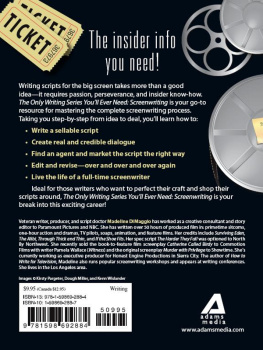

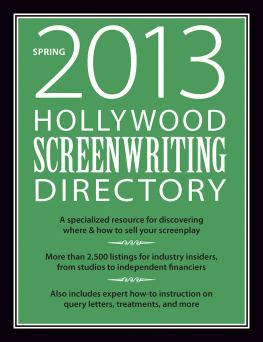
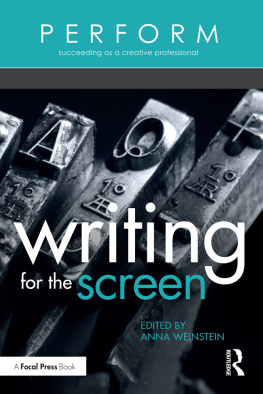
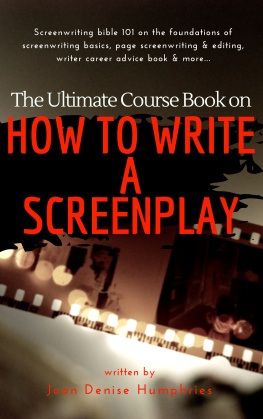
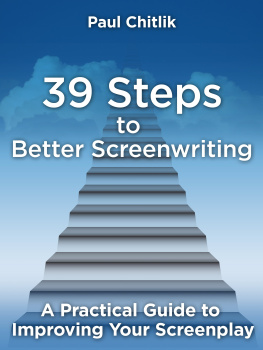
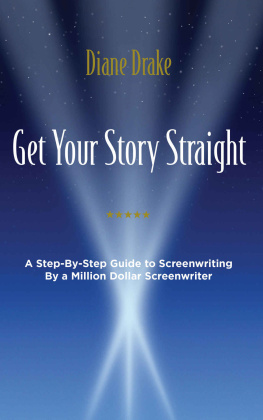
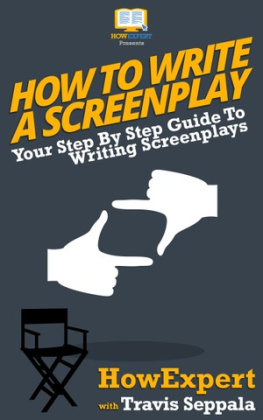
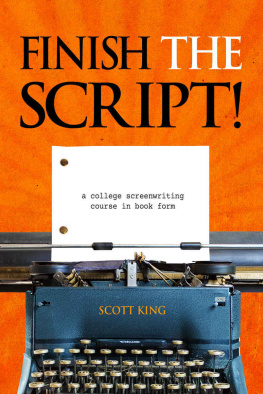
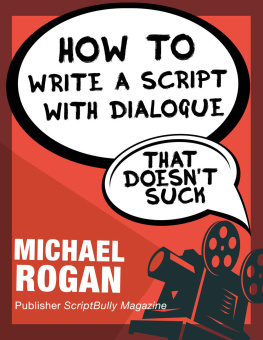



 One time I got so stuck I had to look in a book I wrote to see what I had to say about it! I've threatened to quit, and yet I can't seem to stop writing. I've cursed the industry, but I can't seem to leave it. Someone once said Hollywood is an asylum where the lunatics are terrified of being let out. That said, film is the most exciting and powerful medium in existence. I can't even talk about a great movie without getting chilled to my bone. Careers in this industry are like roller coasters, but the freedom to create, the thrill of bouncing ideas off creative minds, the joy of newness with every project, and the excitement of seeing your work on the screen has been worth it for me. Some people regret having been faced with the same unknowns, the continual rejections, the flux of income, writing in hopes of a sale, but if you asked me if I would do it all again and I wouldn't even blink before I answered yes.
One time I got so stuck I had to look in a book I wrote to see what I had to say about it! I've threatened to quit, and yet I can't seem to stop writing. I've cursed the industry, but I can't seem to leave it. Someone once said Hollywood is an asylum where the lunatics are terrified of being let out. That said, film is the most exciting and powerful medium in existence. I can't even talk about a great movie without getting chilled to my bone. Careers in this industry are like roller coasters, but the freedom to create, the thrill of bouncing ideas off creative minds, the joy of newness with every project, and the excitement of seeing your work on the screen has been worth it for me. Some people regret having been faced with the same unknowns, the continual rejections, the flux of income, writing in hopes of a sale, but if you asked me if I would do it all again and I wouldn't even blink before I answered yes.